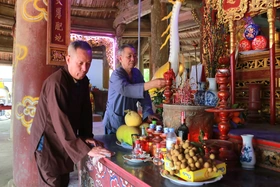{title}
{publish}
{head}

baophutho.vn On the morning of July 30, at Thuong Temple on Nghia Linh mountain within the Hung King Temple Historical Site, a delegation from the...

baophutho.vn Following the reorganization of commune-level administrative units, the Muong Vang region, formerly part of Lac Son district, was restructured...

baophutho.vn On the quiet Hill 79 in Hoa Binh Ward, nestled in the heart of the city along the Da River, lies a memory zone that quietly preserves the...

baophutho.vn The traditional art of creating skirt patterns among the Muong people, originally in Hoa Binh province, now part of Phu Tho province, has been...

baophutho.vn The Ministry of Culture, Sports, and Tourism has officially released the latest List of National Intangible Cultural Heritages, with the newly...

baophutho.vn The project to merge the three provinces of Phu Tho, Vinh Phuc, and Hoa Binh into a new Phu Tho province places high demands on solidarity and...

baophutho.vn With the desire not only to preserve the cultural space of the ancient Muong people but also to build a high-quality tourism destination rich...

baophutho.vn The Ministry of Culture, Sports and Tourism has officially recognized two traditional festivals in Phu Tho province as National Intangible...

baophutho.vn Phu Tho—the land of national origins—is home to more than 1,064 valuable historical and cultural relics. In recent years, efforts to enhance...

baophutho.vn For generations, ethnic minority communities in Thanh Son District have steadfastly preserved their traditional cultural values—woven deeply...

baophutho.vn Huong Can commune, Thanh Son district, conducted the Khoang Communal House festival on February 24 (lunar January 15) in 2024.

baophutho.vn Thanh Ba district conducted a ceremony on February 23 (lunar January 14) to obtain the National Intangible Cultural Heritage “Du Yen Temple...